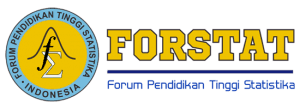- Focus and Scope
- Section Policies
- Peer Review Process
- Open Access Policy
- Archiving
- Publication Ethics
Focus and Scope
Jambura Journal of Probability and Statistics publishes papers on the theory and application of probability and statistics with coverage:
- Probability Theory : Probability theory is a branch of mathematics concerned with quantifying uncertainty. It provides a framework for understanding and analyzing random phenomena, such as coin flips, dice rolls, and the outcomes of experiments. Key concepts in probability theory include sample space, event, probability measure, probability distribution, random variables, expected value, and variance and standar deviation. Probability theory finds applications in various fields, including statistics, machine learning, finance, physics, and computer science. It provides the foundation for making predictions, modeling uncertainty, and making decisions in the presence of randomness.
- Mathematical Statistics : Mathematical statistics is a branch of mathematics that deals with the study of statistical methods and theory. It involves the development of mathematical models, techniques, and methodologies used in the collection, analysis, interpretation, and presentation of data. Mathematical statistics aims to provide a rigorous framework for making inferences and decisions based on data, often involving probability theory, calculus, linear algebra, and other advanced mathematical concepts. Key concepts in mathematical statistics include probability theory, statistical inference, sampling theory, parametric and nonparametric methods, Bayesian statistics, regression analysis, time series analysis, spatial and temporal analysis, and multivariate analysis. Mathematical statistics plays a crucial role in various fields such as economics, engineering, biology, psychology, and many others, providing tools for making informed decisions based on data analysis and inference.
- Computational Statistics : Computational statistics is a branch of statistics that focuses on the development and application of computational methods and algorithms for statistical analysis. It involves using computers to perform various statistical tasks, such as data analysis, modeling, simulation, and inference. Key concepts in computational statistics such as statistical computing, statistical modelling, statistical inference, simulation studies, high-performance computing. Computational statistics plays a crucial role in various fields, including science, engineering, finance, healthcare, and social sciences, where statistical analysis of data is essential for decision-making and knowledge discovery.
- Stochastic Processes : Stochastic processes are mathematical models used to describe the evolution of random variables over time or space. They're particularly useful for understanding systems where randomness plays a significant role, such as in physics, biology, finance, and engineering. Key concepts in stochastic process such as random variable, time, sample paths, Markov property, discrete- time stochastic processes, continuous-time stochastics processes, markov chains, poisson processes.
- Data Science : Data science is a multidisciplinary field that involves extracting insights and knowledge from data through various techniques such as data analysis, machine learning, statistics, and data visualization. It combines elements of mathematics, statistics, computer science, domain knowledge, and communication skills to uncover patterns, trends, and associations within datasets. Key components and concepts within data science include data collection and acquisition, data cleaning and preprocessing, exploratory data analysis, statistical analysis, machine learning, model evaluation and validation, data visualization and communication.
- Applied Statistics : Applied statistics involves the practical application of statistical methods, techniques, and principles to solve real-world problems in various fields. It encompasses the use of statistical tools and methodologies to analyze data, make informed decisions, and draw meaningful conclusions. Key concepts in applied statistics such as data collection, data analysis, hypothesis testing, experimental design, quality control and process improvement, and survival analysis.
Section Policies
Articles
Peer Review Process
- All articles that is submitted to Jambura Journal Of Probability and Statistics (JJPS) should free plagiarism and suitable with focus and scope and author guidelines.
- Before the review process, all articles will be checked the plagiarism and the suitability format.
- The research article submitted to this online journal will be peer-reviewed at least 1 (two) reviewers. We use double blind peer review process. The decision is made based on the evaluation reports from the reviewers. Whenever necessary, we ask a advanced reviewer to evaluate the paper.
- The accepted research articles will be available online (free download) following the journal peer-reviewing process. Final decision of articles acceptance will be made by Editors according to Reviewers comments. Language used in this journal is Indonesian and English.
- The decision made for the article is the result of the Editorial Board’s agreement based on the suggestions proposed by the reviewer(s) and the double blind review process.
- Plagiarism scanning will be conducted with the help of Anti-Plagiarism Software.
- All articles published Open Access will be immediately and permanently free for everyone to read and download.
Open Access Policy
This journal provides immediate open access to its content on the principle that making research freely available to the public supports a greater global exchange of knowledge.
Archiving
This journal utilizes the LOCKSS system to create a distributed archiving system among participating libraries and permits those libraries to create permanent archives of the journal for purposes of preservation and restoration. More...
Publication Ethics
Jambura Journal of Probability and Statistics (JJPS) is a peer-reviewed journal published by the Department of Mathematics, Universitas Negeri Gorontalo. This journal is available in print and online and highly respects the publication ethic and avoids any type of plagiarism. This statement explains the ethical behavior of all parties involved in the act of publishing an article in this journal, including the author, the editor in chief, the editorial board, the peer-reviewers and the publisher. This statement is based on COPE’s Best Practice Guidelines for Journal Editors .
Ethical Guideline for Journal Publication
The publication of an article in a peer-reviewed journal of JJPS is an essential building block in the development of a coherent and respected network of knowledge. It is a direct reflection of the quality of the work of the authors and the institutions that support them. Peer-reviewed articles support and embody the scientific method. It is therefore important to agree upon standards of expected ethical behaviour for all parties involved in the act of publishing: the author, the journal editor, the peer reviewer, the publisher, and the society.
Department of Mathematics Universitas Negeri Gorontalo as the publisher of JJPS takes its duties of guardianship over all stages of publishing seriously and we recognize our ethical behaviour and other responsibilities. We are committed to ensuring that advertising, reprint or other commercial revenue has no impact or influence on editorial decisions. In addition, the Department of Mathematics, Universitas Negeri Gorontalo and Editorial Board will assist in communications with other journals and/or publishers where this is useful and necessary.
Publication decisions
The editor of the JJPS is responsible for deciding which of the articles submitted to the journal should be published. The validation of the work in question and its importance to researchers and readers must always drive such decisions. The editors may be guided by the policies of the journal's editorial board and constrained by such legal requirements as shall then be in force regarding libel, copyright infringement, and plagiarism. The editors may confer with other editors or reviewers in making this decision.
Fair play
The editor at any time evaluates manuscripts for their intellectual content without regard to race, gender, sexual orientation, religious belief, ethnic origin, citizenship, or political philosophy of the authors.
Confidentiality
The editor and any editorial staff must not disclose any information about a submitted manuscript to anyone other than the corresponding author, reviewers, potential reviewers, other editorial advisers, and the publisher, as appropriate.
Disclosure and conflicts of interest
Unpublished materials disclosed in a submitted manuscript must not be used in an editor's own research without the express written consent of the author.
Duties of Editors
The editor is responsible for deciding which of the articles submitted to the journal should be published. The validation of the work in question and its importance to researchers and readers must always drive such decisions. The editors may be guided by the policies of the journal's editorial board and constrained by such legal requirements as shall then be in force regarding libel, copyright infringement, and plagiarism. The editors may confer with other editors or reviewers in making this decision.
Fair play. The editor at any time evaluates manuscripts for their intellectual content without regard to race, gender, sexual orientation, religious belief, ethnic origin, citizenship, or political philosophy of the authors.
Confidentiality. The editor and any editorial staff must not disclose any information about a submitted manuscript to anyone other than the corresponding author, reviewers, potential reviewers, other editorial advisers, and the publisher, as appropriate.
Disclosure and conflicts of interest. Unpublished materials disclosed in a submitted manuscript must not be used in an editor's own research without the express written consent of the author.
Duties of Reviewers
Contribution to Editorial Decisions. Peer review assists the editor in making editorial decisions, and through the editorial communications with the author, it may also assist the author in improving the paper.
Promptness. Any selected referee who feels unqualified to review the research reported in a manuscript or knows that its prompt review will be impossible should notify the editor and excuse himself from the review process.
Confidentiality. Any manuscripts received for review must be treated as confidential documents. They must not be shown to or discussed with others except as authorized by the editor.
Standards of Objectivity. Reviews should be conducted objectively. Personal criticism of the author is inappropriate. Referees should express their views clearly with supporting arguments.
Acknowledgement of Sources. Reviewers should identify relevant published work that has not been cited by the authors. Any statement that an observation, derivation, or argument had been previously reported should be accompanied by the relevant citation. A reviewer should also call to the editor's attention any substantial similarity or overlap between the manuscript under consideration and any other published paper of which they have personal knowledge.
Disclosure and Conflict of Interest. Privileged information or ideas obtained through peer review must be kept confidential and not used for personal advantage. Reviewers should not consider manuscripts in which they have conflicts of interest resulting from competitive, collaborative, or other relationships or connections with any of the authors, companies, or institutions connected to the papers.
Duties of Authors
Reporting standards. Authors of reports of original research should present an accurate account of the work performed as well as an objective discussion of its significance. Underlying data should be represented accurately in the paper. A paper should contain sufficient detail and references to permit others to replicate the work. Fraudulent or knowingly inaccurate statements constitute unethical behaviour and are unacceptable.
Data Access and Retention. Authors are asked to provide the raw data in connection with a paper for editorial review, and should be prepared to provide public access to such data (consistent with the ALPSP-STM Statement on Data and Databases), if practicable, and should, in any event, be prepared to retain such data for a reasonable time after publication.
Originality and Plagiarism. The authors should ensure that they have written entirely original works, and if the authors have used the work and/or words of others that this has been appropriately cited or quoted.
Multiple, Redundant or Concurrent Publication. An author should not, in general, publish manuscripts describing essentially the same research in more than one journal or primary publication. Submitting the same manuscript to more than one journal concurrently constitutes unethical publishing behaviour and is unacceptable.
Acknowledgement of Sources. Proper acknowledgement of the work of others must always be given. Authors should cite publications that have been influential in determining the nature of the reported work.
Authorship of the Paper. Authorship should be limited to those who have made a significant contribution to the conception, design, execution, or interpretation of the reported study. All those who have made significant contributions should be listed as co-authors. Where there are others who have participated in certain substantive aspects of the research project, they should be acknowledged or listed as contributors. The corresponding author should ensure that all appropriate co-authors and no inappropriate co-authors are included on the paper and that all co-authors have seen and approved the final version of the paper and have agreed to its submission for publication.
Disclosure and Conflicts of Interest. All authors should disclose in their manuscript any financial or other substantive conflicts of interest that might be construed to influence the results or interpretation of their manuscript. All sources of financial support for the project should be disclosed.
Fundamental errors in published works. When an author discovers a significant error or inaccuracy in his/her own published work, it is the author’s obligation to promptly notify the journal editor or publisher and cooperate with the editor to retract or correct the paper.
======================================
Ismail Djakaria
Editor-in-Chief,
Jambura Journal of Probability and Statistics







.jpg)






